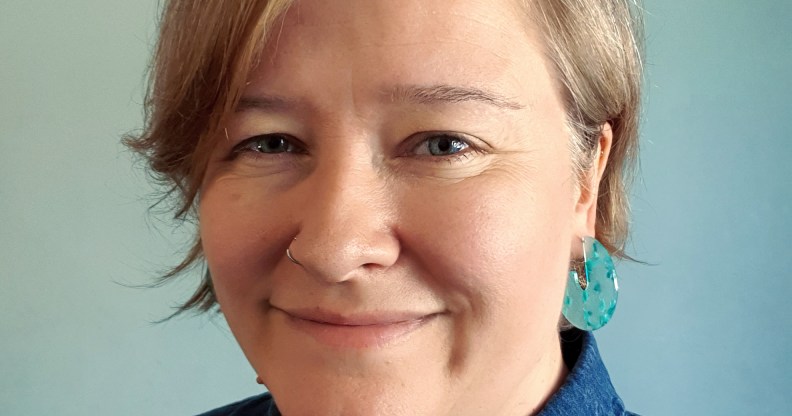New Stonewall chief Nancy Kelley assures trans community ‘we will get there’ in hopeful, impassioned speech

Nancy Kelley, the chief executive of Stonewall. (Image supplied)
Stonewall’s new chief executive Nancy Kelley has assured the trans community that their rights will ultimately be vindicated in a powerful, hopeful speech.
Kelley, who took the helm of the pioneering LGBT+ charity in June, spoke about much-needed reform to the Gender Recognition Act (GRA) in a MyPinkNews Conversations panel discussion. She was joined by Mermaids head of policy and legal Lui Asquith and Mridul Wadhwa, manager at Forth Valley Rape Crisis Centre.
In the wide-ranging discussion, Kelley spoke about the “incredibly toxic” online discussion around trans rights – and said the UK’s mainstream press has become “distorted” when writing about trans people.
“I say that as someone that used to be head of policy at refugee camps, so I’ve worked in issues where the mainstream press has got a very particular take.”
Kelley said coverage of trans people’s lives in the mainstream media is often “unbalanced”, noting that much of the commentary does not reflect public opinion.
“We know the majority of the public are actually pretty pro-trans.”
She added that the toxic online debate and the unbalanced media narrative have come together to have a chilling effect on government policy.
The result, according to Kelley, is that many people have made “false connections” between obtaining a Gender Recognition Certificate (GRC) and other issues, such as trans healthcare and access to single-sex spaces.
Reform to the Gender Recognition Act (GRA) might seem a long way off, but Kelley assured trans people that their rights will ultimately be vindicated.
“What I really want to say there, as chief executive of Stonewall, is we are going to get there, not just on GRA but on access to high quality healthcare, on safety, on hate crime, we are going to get there.”
Kelley continued: “They were saying all of this s**t about me not very long ago, as a cis lesbian. We are going to do it, and we are going to do it together.
“I think it is so hard right now – it is really hard for the trans community – but I just feel so strongly that we will stand together and we will get there.”
Excluding trans people from single sex spaces would be a ‘new oppression’.
Elsewhere in the discussion, Mermaids head of policy Lui Asquith reflected on the “new oppression” that would come about if trans and non-binary people were excluded from single sex spaces.
“We keep talking about the rollback of rights, and actually what we’re talking about here, potentially, is new suppression, new oppression,” they said.
“The idea that the law will change around single sex spaces, for example – that isn’t a rollback – trans people have always been able to use the facilities that make them most comfortable. Changing that would be a new form of oppression. And it’s really important that we’re aware of that.”
However, Asquith reminded trans and non-binary people that they have the right to “walk through society” as themselves – regardless of what others think.
“Please know that we see you, and we will keep advocating for you, and there’s so much hope that’s to come.”
Mridul Wadhwa, manager at Forth Valley Rape Crisis Centre, also addressed the offensive anti-trans argument that allowing trans people into single sex spaces puts cis women at risk.
“The threat to single sex spaces, if there is any… is from men,” she said, “and they don’t need to enter single sex spaces to be harmful to women and girls.”
The way they speak about it is very white supremacist.
She also reminded viewers that the issue of single sex spaces has “nothing to do” with the Gender Recognition Act, despite attempts by anti-trans activists to link the two.
Wadhwa said that her organisation has tried to engage with women who are concerned with trans people’s access to single sex spaces in the past – but their efforts were futile.
“After a point, we had to stop, because… it was very evidenced from how they were speaking to us, their interest was not in the safety of women and girls… Their focus was trans women. There’s no conversation about trans men, as though they don’t exist, and non-binary people, as though they don’t exist or don’t matter.”
She added: “To me, the way they speak about it, as a woman of colour as well, is very white supremacist, exclusionary. I mean, they would never admit to that, obviously, but that is how I experienced it.”
The panel discussion is available to watch in full – exclusively for MyPinkNews members – here.

